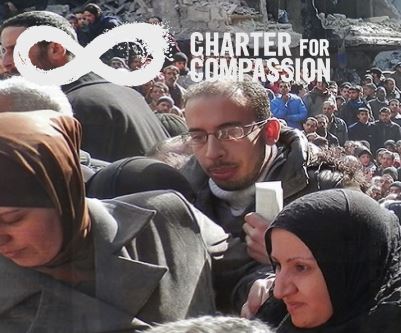
I’ve just been writing an essay about serial killers. So it comes as some relief to write a post for this month’s We Are the World Blogfest, if only to remind myself that not all of us get a kick from dismembering people. In fact many of us are compassionate, which is just as well because the world is in dire need of compassion. Fortunately, Karen Armstrong had the good idea to draw up a Charter for Compassion, reminding us that The principle of compassion lies at the heart of all religious, ethical and spiritual traditions, calling us always to treat all others as we wish to be treated ourselves. […] Born of our deep interdependence, compassion is essential to human relationships and to a fulfilled humanity. It is the path to enlightenment, and indispensable to the creation of a just economy and a peaceful global community.
The good news isn’t the charter itself, of course, but the fact that it’s been signed by over two million people, as well as whole communities in over 50 countries. Again, signing a charter is easy; acting according to its principles is harder. But these communities commit to drawing up concrete proposals to enhance compassion in people’s daily lives. Compassionate Cornwall, for example, counts among its aims:
- To build a culture that firmly embraces and celebrates diversity.
- To inspire and support Cornwall’s young people, through education and personal development, to recognize the need to live compassionately and take action to do so.
- To address loneliness and isolation, reaching out to those who feel excluded and helping them to find a valued place within our communities.
Or in Khairo Dero, Pakistan, different events are organised:
- Readings from the Charter for Compassion and group discussions.
- Readings from Karen Armstrong’s Letter to Pakistan and Twelve Steps to a Compassionate Life.
- Short plays developed and performed by village children on the theme of compassion.
- Drawing competitions about compassion.
- Compassion Counter: We maintain a journal at the Community Center where adults and children can come and record their acts of compassion. We’ve crossed 700 acts and are aiming to hit 1,000 by the summer. Two examples: a schoolboy took a few extra moments to clear away stones from the road so passengers wouldn’t be hurt and on a chilly January morning, and a teacher brought in one of her favorite sweaters for a maid who didn’t have any warm clothes.
Naween Mangi, initiator of the Khairo Dero project, says, ‘As we began taking these small, practical steps, we started noticing a change in the way villagers interacted with each other. […] Individual demands of “more for me” started to slowly give way to the idea of sharing.’
A simple idea, isn’t it? But Karen Armstrong had the vision to take a concept that’s been around for a few thousand years and inject it with new life. And it isn’t just a handful of serial killers that are going to stop it.
Thanks to Belinda Witzenhausen, Lynn Hallbrooks, Michelle Wallace, Sylvia McGrath and Sylvia Stein for co-hosting this month’s WATWB.
Reblogged this on Space, Time, and Raspberries and commented:
How simple. Help for humanity.
It seems that common sense and decency spread best through example, doesn’t it?
Indeed. I think it’s something most of us have but often don’t think of expressing, so hearing about others is an encouragement in itself.
Hi Curtis – I hadn’t heard of Karen Armstrong,nor knew about the Charter for Compassion …so thanks for sending me off in that direction to look further … but I did note the reference to Cornwall and I love that county – so again was drawn in to look further … I’ll need to do even more of that. I will remember the Compassionate Cornwall set up … and very likely will write about them separately in due course … thanks so much highlighting this organisation – we all need to be compassionate towards our fellow men. Cheers Hilary
Wonderful, Hilary – thank you! There were many examples on the site but the reason I chose Cornwall (which I’ve never visited!) was my blogging friend Dookes, who writes about it beautifully.
Lovely post thank you – I know Karen Armstrong as a scholar, writer, theologian etc – she is so great. The Charter Compassion is wonderful.
Thank you, Susan. I first got to know her through some book reviews, then listened to her speaking – a voice of great lucidity battling against obscurantism.
Thanks for highlighting these wonderful organisations, and for your support to WATWB!
You’re welcome, Damyanti. Thank you for pioneering!
Fantastic post! I’ve been taking courses for a few years and have become involved with a project that studies successful co-existence throughout history. For me understanding what worked during the more volatile moments in history is the key to having a peaceful future. In my opinion, Ms Armstrong is on point. Thanks so much for sharing this! #WATWB
You’re welcome, Belinda. That sounds like a fascinating project you’re involved with. Looking through history, it’s difficult to be a fan of organised religion in any form, but if we focus on religious values, as K. Armstrong does, the message is much more hopeful.
Comments are closed.